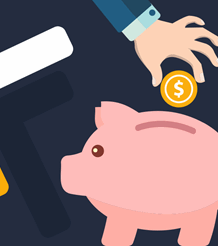
Guide to Property in Thailand
Many home buyers are considering property in Thailand as it offers great medium to long term profits while allowing investors to afford more for their money than in many other worldwide locations. Thailand easily accessed by affordable flights and is the most popular of all Asian tourist destinations. Thai property is set to increase in popularity as the country continues to invest heavily in its tourist infrastructure and economy.
Propertyshowrooms.com and Property in Thailand
The Thailand property market has been less damaged by current economic gloom than some other Asian countries. Many have seen enormous growth and are expected to experience a correspondingly dramatic fall in their economies. However, Thailand’s slower growth in the property sector, accompanied by its continued appeal as a top holiday destination are now allowing it to weather the current financial storm a good deal better than other markets. Well chosen property in Thailand, particularly in off-plan developments, remains a relatively stable longer term investment opportunity.
Tourism numbers are of course down so that investors who purchased buy-to-let properties in Thailand have a smaller target market in the short term. Many investors are taking advantage of the fact that the government currently regards foreign purchase of land and property as a great opportunity and the purchase process for foreigners is becoming a lot less complicated than in the past.
There are a series of superior property developments currently being constructed that are receiving great interest in both the resorts of Hua Hin and Lanta Island. These areas of Thailand are under the process of being brought up to the high levels of infrastructure that Phuket now offers.
Investors in Thailand are still keen to get into the property market because the overall appeal of Thailand as a tourist destination has not changed. It is a vibrant, exotic, charming and exciting country that offers property investors good medium to long term potential, while the government is currently encouraging foreign investment in Thailand through several tax advantages.
Can Foreign Nationals Own Property in Thailand?
Yes, you can own freehold property in Thailand and there is a recognised process that is not too complicated. The property will be owned by a Thai limited company of which a foreign national can only own 39% with the other 61% being held by six Thai shareholders. On the day of company registration, the six Thai shareholders sign their share transfer forms, which are all blank and undated, and all proxy voting forms are signed and handed over. Alternatively, you can buy through a leasehold agreement which, in the case of a condominium unit purchase, is renewable for periods of 30 years.
A hassle-free way to own a property in your own name is to buy into a condominium development where Thai nationals own at least 51% of the units.
Why Should I Choose Thailand?
Thailand has recently attracted significant foreign investment to become one of the Asian economic leaders. It is a regional base from which many companies keep their employees working all around Asia.
Property is much cheaper in Thailand than elsewhere and an increase in overseas interest in property purchase has greatly helped the country’s economy.
An exotic destination with beautiful mountains, dense forests and stunning beaches, Thailand is an established and sophisticated tourist destination with great universal appeal. Thailand is one of the cheapest places to fly to in Asia. The completion of the Suvarnabhumi-Bangkok International Airport (SBIA) is expected to spur growth in commercial property markets in eastern Bangkok as well as make Thailand even more accessible by air.
Thailand has good schools, an efficient health care system and it is seen as a friendly country in which to live, visit or invest.
What is the Economic and Political situation?
Foreign buyers are ready to invest in Thailand as the country's fundamental factors are still attractive. Now, with unrest following the election of a new prime minister, Somchai Wongsawat of the People Power Party (PPP) on 17th September, many people are sitting on the fence to see what becomes Thailand’s political crisis, while the current situation is of course hardly sustainable.
The Thai government sees foreign investment as a great asset while the dropping of certain financial requirements now makes investment an easier option than ever before.
How do we Travel to Thailand?
Thailand has three international airports; Bangkok, Chiang Mai and Phuket.
Heathrow – Bangkok: Thai Airways International currently flies twice daily.
Other airlines going to Bangkok include Eva Air, British Airways, Qantas, Phuket Air and Emirates
The new international airport at Pattaya, with flights at around £500 return from the UK, and the Suvarnabhumi Airport caters for the high volume of passenger traffic in Thailand.
What is the Direct Flying Time from UK to Thailand?
Flying time from Europe to Bangkok is approximately 12 hours.
Is a Visa Required to Enter Thailand?
You can stay in Thailand without a visa for up to 30 days, after which you should apply to the Thai Immigration Office before the visa expires.
If you will be in Thailand on business, you must apply for a "non-immigrant category B" visa.
Retirement visas are available for foreigners over 50 years of age and are issued according to financial means.
Property Buying Process in Thailand
The information below is intended as a general guide to the property buying procedure in Thailand. We will gladly guide you through the procedure and help you avoid any pitfalls.
Property Titles
As a foreigner, if you plan to buy land or a villa then you will be required to set up a Thai limited liability company which will cost around £1,000 and will also have ongoing fees of approximately £50 per month. Alternatively you will need to purchase through a leasehold agreement.. Although a freehold title could be regarded to be a distinct advantage, in reality, a leasehold title bears no specific disadvantage to the purchaser. Both forms of purchase are safe and effective means of property ownership by foreigners in Thailand.
Buying Condos
Non-Thai nationals can generally purchase units in new developments throughout Thailand without significant restrictions, while avoiding the occasional inconvenience of nationality restrictions. The one proviso is that the foreign ownership ratio must not exceed 49% (some units in central Bangkok may not be subject to this restriction). Condo purchase is popular for investment as well as residence and retirement purposes.
Condos can be bought as either leasehold or freehold properties, depending on the development in which you buy. Units can be leased to foreigners for periods of up to 30 years and may have options to renew. You will need a lease of at least 3 years to register your property with the Land Department, an advisable step in the case of buildings that have exceeded their foreign ownership ratios.
Using an Agent
A good agent is essential when you buy a property in Thailand. Propertyshowrooms.com always carefully examine your particular investment requirements and provide you with a selection of options from our database. In addition, we will recommend all related professional services you will require to make a safe and reliable purchase.
Appointing a Lawyer
It is wise to appoint a lawyer who is fluent in your language so that you understand properly all the legalities and proceedings.
Lawyers Will:
- Check the current owners have the correct title to the property
- Check for any charges and liabilities still owed on the property
- Check your contract and advise you on the obligations for both parties
- Help you through the payment/funds transfer
- Ensure that the property is registered appropriately and in your name
The Initial Purchase Agreement
The initial purchase agreement will detail price, terms and conditions, settlement date etc. and in most cases a 10% deposit will be required to secure the property. This deposit is refundable should the sale not go through, as long as it is not your fault.
Reservation Fee
When buying a new condominium, an initial reservation deposit of about USD 1,500 is required and this amount is deducted at a later stage from the total price. Once an agreement is signed, usually 10 to 15 days after the reservation, the buyer is required to pay 10% of the total price. Depending on the terms of the contract, the balance then could be due in installments or as a lump sum at the time the title is transferred.
Fees
As a general rule, for residential sales you can expect the total fees and taxes to work out to be approximately 2 to 3% of the property market value.
Stamp Duty of 0.5% and transfer fees of 2% have, for now, been waived for the short term as the government entices buyers to the market.
A business tax of 3.3 % (levied against a vendor who has been in registered possession of the property less than 5 years) is also charged, along with income tax (similar to capital gains tax) at a variable rate.
Finance & Mortgages
Mortgages in Thailand are still relatively difficult to arrange. However, recently a new branch of the Bangkok Bank has opened in Singapore, which has created borrowing possibilities for foreigners living in Thailand, offering finance of as much as 70% over a maximum of 20 years.
You can choose between three currencies: Euros, Singapore Dollars and US Dollars, and the currency will affect the rate of interest which is payable on the loan. This is a very new service and you are urged to do your homework before opting for a Thai mortgage.
HSBC has a presence in Thailand and can also offer loans of between 1,500,000 and 35,000,000 Thai Baht. Typically they will lend up to 80% of the purchase price and interest rates can be fixed for up to three years.
To buy a condo or another property with a loan, many purchasers obtain a mortgage in their home country and then transfer the money to a Thai bank account, while using a lawyer to oversee the logistics of the process.
Banking in Thailand
Banks in Thailand provide a good range of services throughout the country and many of the foreign banks are also represented. Below is a general insight into the banking situation of Thailand.
Opening hours are usually from 8.30-15.30 Monday to Friday except for bank and public holidays.
Strictly speaking foreigners cannot open a bank account without a work permit but they usually allow foreigners to open savings accounts. Cheques can be paid into a savings account and clearance time is about 1.5 days. Foreign currency accounts can be opened but they are subject to Thailand 's foreign exchange rules. Interest rates are very low but there is normally no charge.
Several forms of identification will be required to open an account including passport, current credit cards, work permit etc. and most will require a letter from your employer together with current visa status.
- Passport
- Work permit
- Thai Nationality reference (only for international bank accounts)
- A minimum deposit of 500 Baht
- The first deposit for an International bank account has to be transferred from overseas
Cash Point Machines (ATM's)
Automatic teller machines (ATM's) are readily available throughout Bangkok and in some of these VISA, MasterCard and American Express cards can also be used as long as you have your pin number. All machines display what cards can be used at that particular ATM.
Major currency notes and travelers cheques are often exchanged at hotels and large shops, all provincial banks, most shopping centers and money changers. Exchange rates are usually best at banks and authorized money changers while current exchange rates will be found in newspapers or at banks and money changers.
Property Taxes
Stamp Duty
Stamp duty of 0.5% and transfer fees of 2% have, for now, been waived for the short term as the government entices buyers to the market.
Business tax of 3.3 % (levied against a vendor who has been in registered possession of the property less than 5 years) is also charged, along with income tax (similar to capital gains tax) at a variable rate.
Land Tax
This is an annual tax levied on land ownership. The amount is often so small that in practice the body charged to collect it rarely bothers to do so. When they do collect it, it is usually after several years when the amount has accumulated.
Structures Usage Tax
This only applies to commercially used properties. The rate is 12.5% on the actual or assessed gross rental value of the property. However, this notional value is well below the commercial market rental value.
If the property is purchased through a company, you need to consider that corporate tax is higher than personal tax, and the cost of setting up the company must be considered as part of the initial investment.
Capital Gains Tax
Capital Gains Tax is very low in Thailand, in the region of 1 and 3%, depending on your level of income.
Income Tax
This is usually between 1.0 and 3.0% on property and is the comparable replacement to capital gains tax. There are no established rules regarding who pays the income tax while this is simply another part of the bargaining process during purchase, as are all other costs relating to the transfer of ownership.
Tax on Rental Income
This tax is charged at between 10 and 30% of the rental income, depending on the type of property leased.



